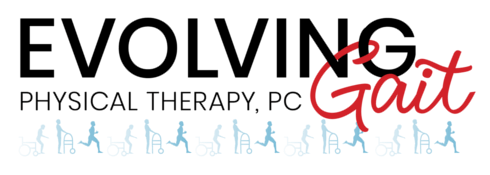Understanding When to See a Physical Therapist for Dizziness
Do you find yourself getting dizzy doing everyday tasks, such as getting out of bed or walking down the driveway to get the mail? Do you find it hard to focus on one thing for long periods of time? Do you feel fatigued, lightheaded, or nauseous at any given time of the day?
If so, some of these can be signs of a common head cold – but they can also be signs of vertigo.
A head cold, also referred to as the “common cold” is exactly that – it is one of the most common ailments people experience each year. On average, an adult will typically get 2-3 head colds a year. You know the feeling – stuffy nose, sore throat, dry cough, achiness… the overall feeling of wanting to stay in bed and drink herbal tea all day.
Luckily, for head colds, that’s actually the best remedy! Most of these “common colds” will go away on their own (with a little relaxation and maybe a cough drop or two) within a week. Our innovative care strategies at Evolving Gait Physical Therapy will help you find quick relief.
If your symptoms remain mild, it is best to just take time and let yourself heal at home, possibly with the aid of some DayQuil or another nose-throat-and-cough syrup that you can purchase at your local convenience store.
However, if your fatigue becomes severe, you begin feeling nauseous, or you start experiencing an overwhelming feeling of dizziness or imbalance, there is a chance you could have vertigo. If so, contact us today and our physical therapists can help relieve your symptoms.
What is vertigo?
Before you can determine whether or not you have vertigo, as opposed to a head cold that will go away on its own, it is important to understand what exactly it is.
As stated by the National Institutes of Health, “Vertigo is an abnormal sensation of motion. It can occur in the absence of motion or when a motion is sensed inaccurately. Spinning vertigo is usually of inner ear origin.”
People who experience vertigo typically report an overwhelming sensation of feeling “off balance.” It can make someone feel dizzy, which can lead to nausea, tunnel vision, or even fainting spells.
Imagine standing still and feeling as if the rest of the world is spinning around you – remember those fun-houses with the uneven floors you used to go in as a kid? That’s essentially what vertigo feels like. But what exactly causes it?
The most common causes of vertigo are:
- BPPV – also known as “benign paroxysmal positional vertigo.” While this sounds like a scary, long-winded prognosis, it is essentially an inner-ear infection. This type of infection occurs when microscopic calcium particles called “canaliths” clump up in the inner ear canals. Your inner ear is responsible for sending gravitational messages to your brain regarding the movements of your body. This is how we remain balanced on a daily basis. When the inner ear canals are blocked, the correct messages are unable to make it to the brain, and we become unbalanced – thus, causing vertigo.
- Meniere’s Disease – this is a disorder of the inner ear. It is caused by a buildup of fluid and fluctuating pressures within the ear. It has the same effect as BPPV, as the fluid and pressure will block messages from the inner ear canal to the brain, resulting in imbalance. Meniere’s Disease can cause long episodes of vertigo, in addition to tinnitus, commonly referred to as “a ringing of the ears,” and even hearing loss in extreme cases.
- Vestibular neuritis – also known as “labyrinthitis.” Again, this sounds much scarier than it is. It is another inner ear infection, which is typically viral. It causes the inner ear and surrounding nerves to become inflamed, resulting, again, in difficulties with balance due to discrepancies regarding gravitational brain messages. This is how vertigo begins.
As you can see, the most common causes of vertigo are due to issues with the inner ear. However, some less common causes of vertigo can include:
- Injury to the head or neck.
- Migraines.
- Medications.
- Stroke.
- Brain tumor.
The most common symptoms of vertigo are:
- Dizziness – this is the most commonly reported symptom of vertigo, also referred to as swaying, spinning, tilting, or even the sensation of being pulled to one direction.
- Nystagmus – this is the phenomenon of experiencing uncontrollable eye movements, commonly referred to as “eye jerks.”
- Tinnitus – this is commonly referred to as “a ringing of the ears.”
- Headaches
- Nausea
- Vomiting
- Fatigue
- Sweating
- Fainting
- Hearing loss
How can we help?
It can undoubtedly be difficult to determine when to seek treatment for something. It is true that vertigo can sometimes go away on its own, but it can also progress and result in worsening symptoms over time. Why would you want to take the risk?
If you believe you may have the symptoms of vertigo or one of its causes, it is important to consult with a doctor immediately.
Physical therapy is a common treatment for vertigo, and our therapists are trained to help alleviate any dizzying, lightheaded, or physically unstable symptoms you may be experiencing.
The most common treatments for vertigo are:
- Vestibular rehabilitation – this form of physical therapy focuses on the vestibular system, located within the inner ear, and the ways in which we can strengthen it. The vestibular system sends the gravitational messages to your brain about your body movements, and focusing on balance-specific exercises can help in strengthening this system, thus diminishing the effects of vertigo.
- Canalith repositioning maneuvers – this form of physical therapy focuses on treatment-specific head and body movements for BPPV patients. These exercises help in moving the calcium deposits out of the inner ear canal to alleviate blockage and allow gravitational messages to be more easily received by the brain. As the blockage shrinks, the symptoms of vertigo will lessen.
If you believe you may be experiencing vertigo, contact us today. We’ll provide relief for all of your dizzying symptoms.


